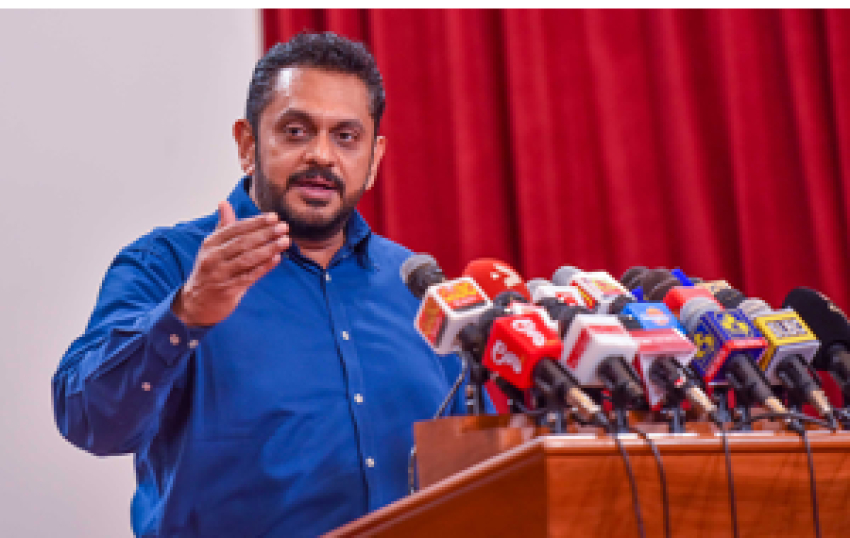The State Minister also revealed plans to utilize 31 identified reservoirs for floating solar power plants, with the potential to generate an additional 3077 MW of electricity. This innovative approach leverages existing infrastructure and resources to address the country’s growing energy needs.
Mr. Rajapaksa emphasized the Ministry of Irrigation’s commitment to enhancing food security, highlighting its role as a key contributor to national food production. He acknowledged the substantial budget allocation of Rs. 23,413 million for the Ministry, with Rs. 6,913 million dedicated to reservoir maintenance and Rs. 16,500 million earmarked for large-scale irrigation projects. This investment demonstrates the government’s prioritization of food security and sustainable agricultural practices.
Further, State Minister Rajapaksa’s announcements paint a picture of a future Sri Lanka powered by renewable energy and abundant food production. The Uma Oya project’s imminent completion and the ambitious plans for floating solar panels are promising steps towards energy independence. Additionally, the significant budget allocation for irrigation projects underscores the government’s commitment to food security and agricultural development. These initiatives offer hope for a brighter future for Sri Lanka’s economy and its people.
The Mahaweli Development Authority has received a significant boost with a local fund allocation of Rs. 4,678 million. Agriculture takes the lion’s share with Rs. 1,590 million, followed by Rs. 930 million dedicated to livestock development. These investments aim to revitalize Sri Lanka’s rural economy and enhance food security.
Meanwhile, the Ministry of Irrigation continues to spearhead large-scale multipurpose development projects, largely funded by foreign loans. One such project, the Uma Oya project, is nearing completion and is expected to contribute 120 MW of electricity capacity to the national grid by February 15. This marks a significant step towards increasing Sri Lanka’s energy independence.
Furthermore, the government is placing strong emphasis on renewable energy sources like solar and hydropower. Several special programs are underway this year to integrate these sources into the national grid. Notably, the initiative to utilize solar cells on land, surface, and water, showcases the commitment to innovative solutions for a sustainable energy future.
In essence, these initiatives highlight Sri Lanka’s multi-pronged approach to rural development, infrastructure upgrade, and clean energy solutions. The combined efforts of the Mahaweli Development Authority and the Ministry of Irrigation, coupled with the focus on renewable energy, promise a brighter future for the country’s economic and environmental well-being.
The Mahaweli Water Security Investment Program has undertaken significant infrastructure projects to address water scarcity issues in Sri Lanka. In collaboration with the Uma Oya project, this program aims to provide irrigation for both existing and new paddy fields.
One key initiative is the restoration of the Minipe Canal. Its embankment has been raised by 3.5 meters, significantly increasing its capacity. Additionally, the program is constructing the North-West Provincial Canal, a 90-kilometer long canal utilizing an 11-kilometer tunnel, further expanding water distribution capabilities.
Furthermore, the program is exploring the potential of solar power generation by identifying 31 reservoirs suitable for floating solar panels. This effort, involving both the Sri Lanka Mahaweli Authority and the Irrigation Department, could harness 2524 MW of power from 14 Mahaweli Authority reservoirs and 553 MW from 17 Irrigation Department reservoirs. These initiatives, all implemented in collaboration with the Ministry of Power and Energy, hold great promise for enhancing water security and sustainable energy production in Sri Lanka.
The North Central Grand Canal brings life-giving water to both people and crops. It ensures year-round irrigation for 7 main tanks and 350 smaller ones, boosting agricultural productivity and food security. Moreover, clean drinking water now reaches 185,000 people, a testament to prioritizing their well-being.
Furthering this commitment to rural development, the World Bank has provided USD 25 million to empower farmers. This investment strengthens farmer organizations, equipping them with the tools and resources to thrive economically, creating a ripple effect that bolsters national food security. The Grand Canal, therefore, stands as a symbol of progress, nourishing both the land and its people.




















